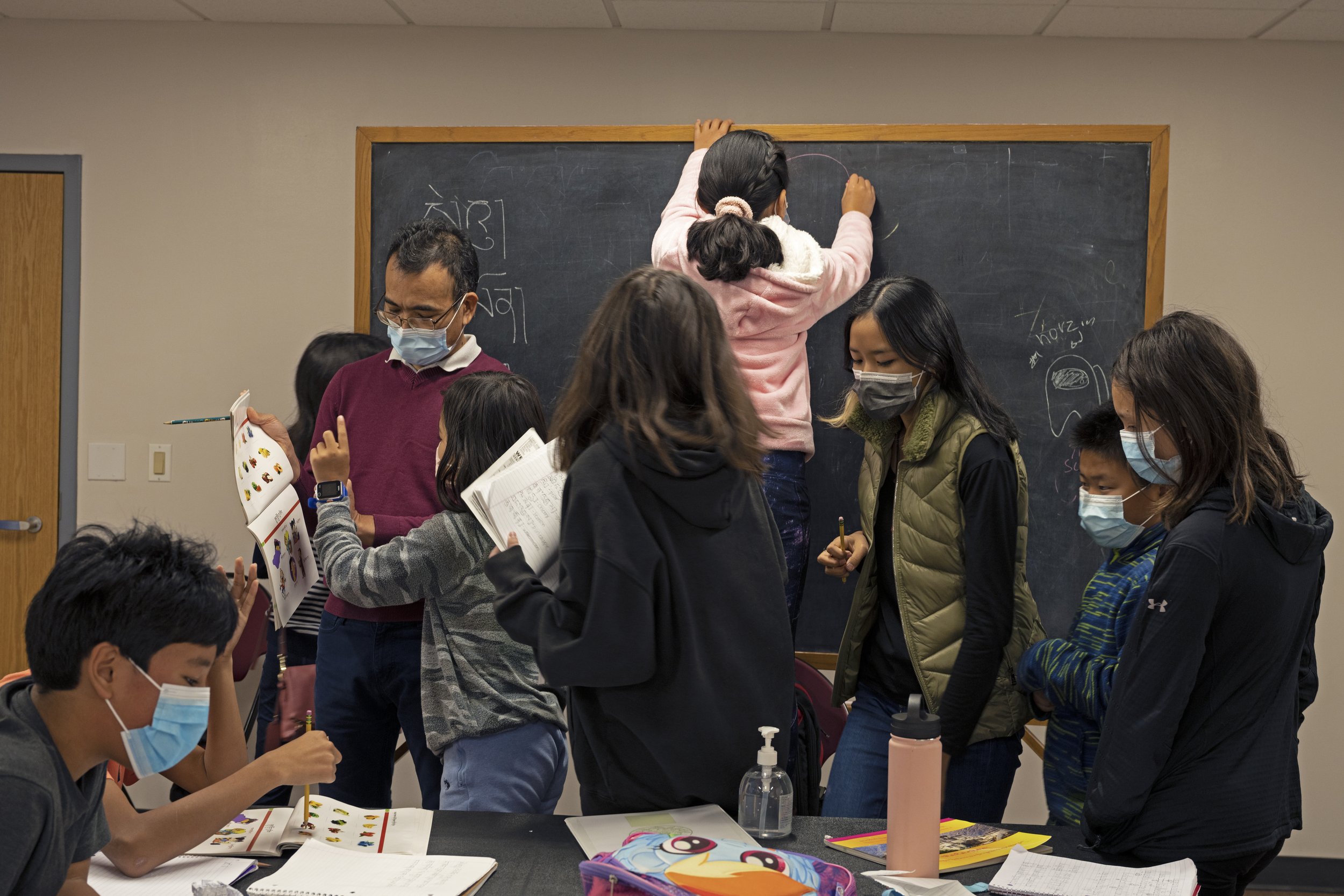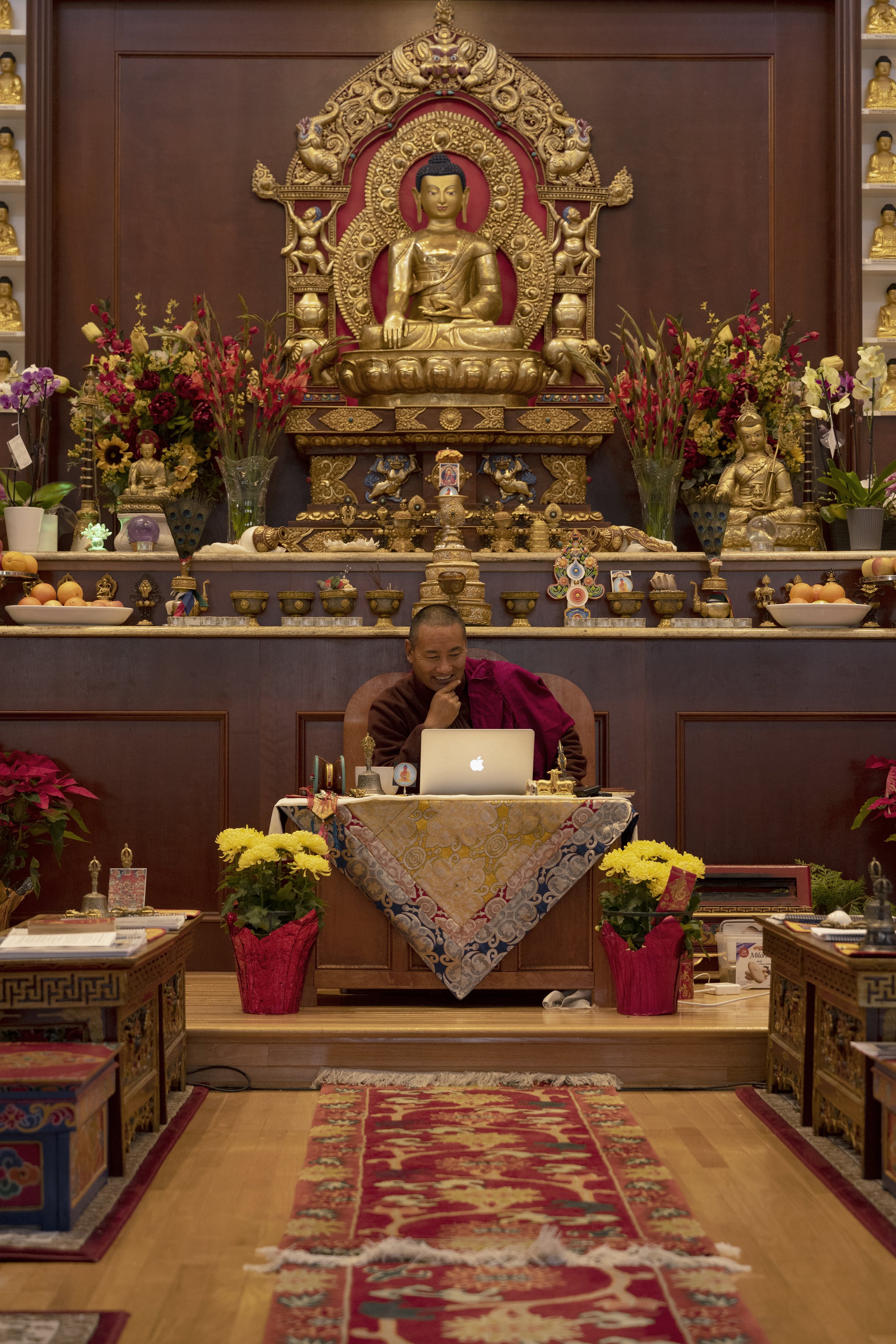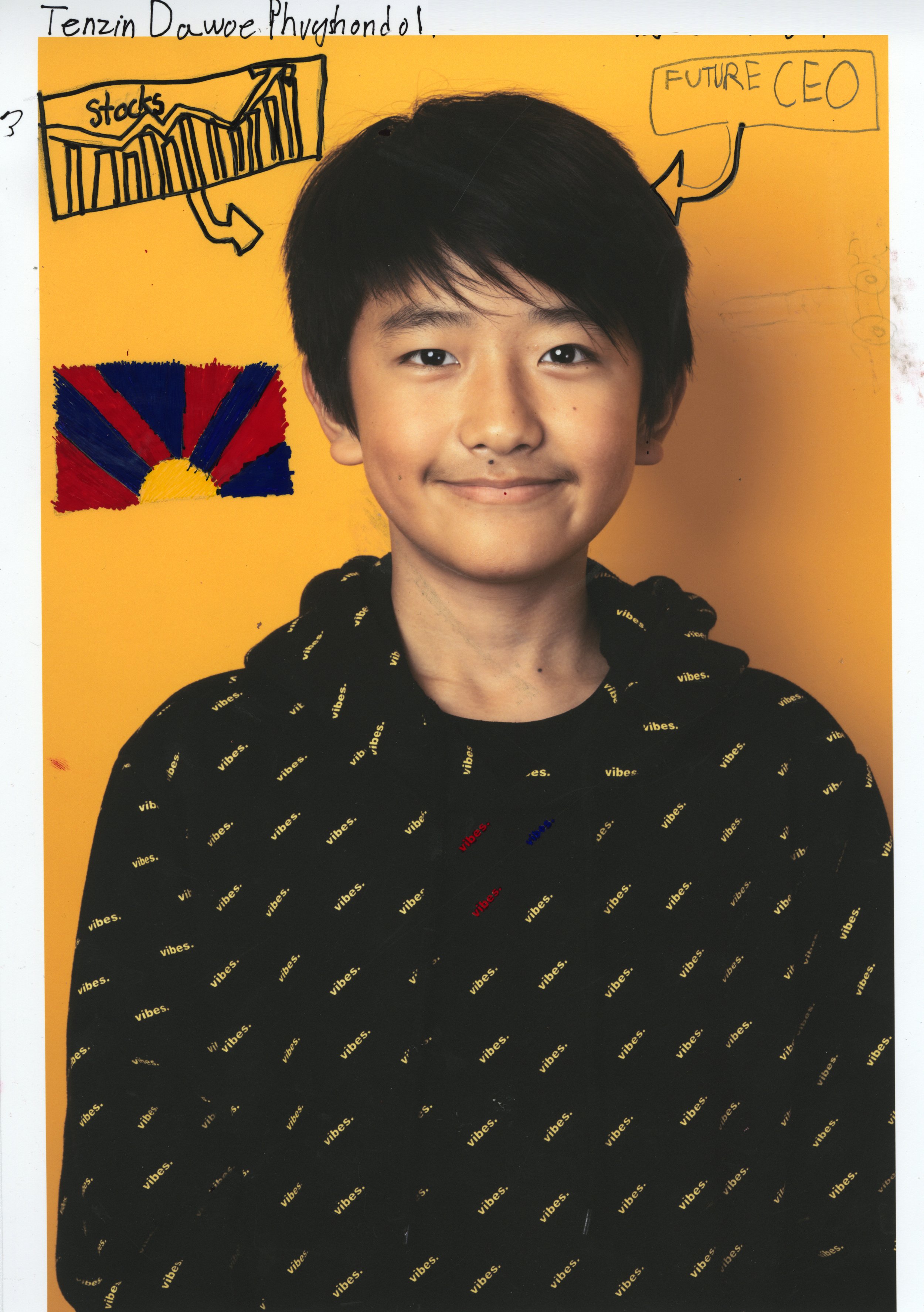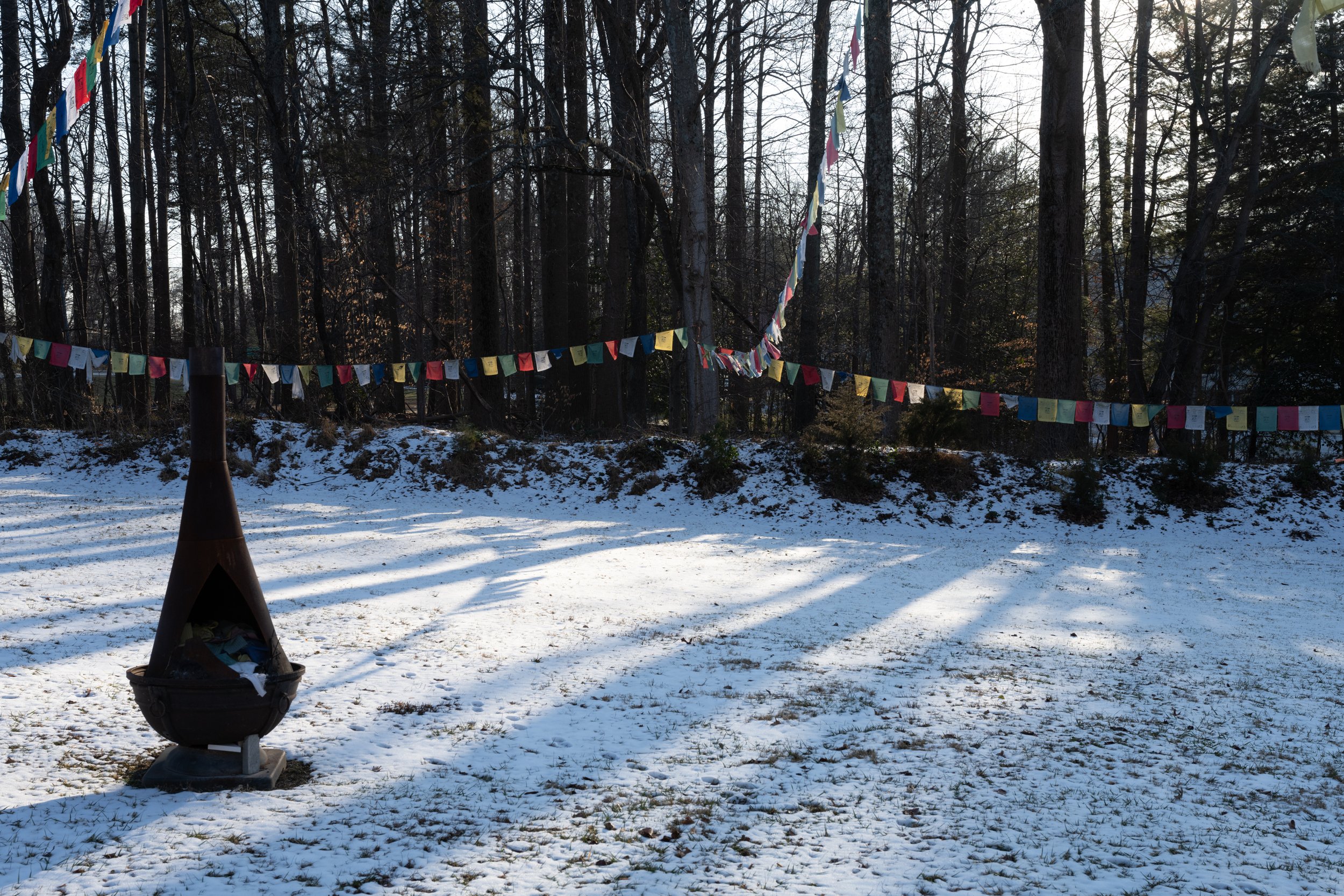Seeking a Homeland
Seeking a Homeland is a multimedia project focused on how Tibetan immigrants preserve and pass down cultural heritage to their children despite being members of the Tibetan diaspora. Starting with the Tibetan Sunday School at the Vienna Community Center, these students learn about their culture through the journey of language, music classes, and practice dancing for the New Year event. This project portrays the struggles of the immigrants’ families, and their efforts to sustain Tibetan culture and identity.
Scroll down to read the article.
Seeking a Homeland
Learning culture and modern education is like a bird with two wings.
“When I keep on saying ‘Jesus Christ’, my ama (meaning mother in Tibetan) told me ‘Mama Jesus Buddha’, so I said ‘Buddha Christ’. Which one is better, Jesus Christ or ‘Buddha Christ’?” A student named Karma shyly raised her little hand and pitched a question in a religious class.
“ ‘Buddha Christ’! Because Jesus Christ is usually used in a bad word,” said Pema without patience.
It is a typical Sunday at the Tibetan Language and Cultural School. Students raise their little hands straight to the ceiling and share everything they knew about the Dalai Lama, the spiritual leader of Tibetan Buddhism, in an elementary class. Before an explanation from the teacher, the students fiercely debate their beliefs.
Like many other ethnic minorities in the D.C. metropolitan area, these Tibetan students have to spend a few hours learning their language.
Tibetan and Language Culture School, a weekend education institute under the Capital Area Tibetan Association (CATA), organizes various programs for Tibetan students, especially in Virginia, D.C., and Maryland, to learn Tibetan language, culture, and dances. The school is run by three Parent-Teacher Association (PTA) board members, affiliated with the Central Tibetan Administration. The courses are designed by the Department of Education, which is under the Tibetan government in exile from Dharamshala, India. Aiming for students to carry on their cultural identity, all the teachers are volunteers. Students are charged a nominal fee of about 10-20 dollars per month, to pay the rent of the classrooms in the Vienna Community Center, VA. These Sunday classes not only have provided these students a supportive environment to learn about language and culture, but also created a platform for parents to get engaged with their Tibetan roots.
Apart from regular classes, CATA has also organized month-long field trips for high school students to Dharamshala. During the trip, they will spend time staying in local Tibetan families, to learn about the essence of the religion and culture. If they are lucky enough, they will have a chance to meet the Dalai Lama in person.
“One thing I've realized is as these kids grow, they are more curious to know about Tibet, and this is the foundation of the benefit of being a part of the Tibetan Sunday School,” said Tenzing Norbu, one of the leading board members of CATA, in his consistently sophisticated tone of voice. He has a pair of remarkable Buddhist-shape earlobes, a representation of great fortune in many Asian cultures.
Born and raised in Sikkim, a small city in India bordered by the Tibet plateau, Tenzing Norbu has spent his childhood in a local Tibetan community.
“After my family lost its independence like Tibet lost its independence to China, my parents had to flee for a life like any other Tibetans,” Tenzing Norbu recalled.
Before surrendering to the People’s Republic of China (PRC) in 1951, Tibet had declared a short period of independence by having its national flag, currency, passport, army, and maintaining diplomatic relations with neighboring countries. A few months later, the leaders of Tibet were forced to sign a treaty offered by the PRC government, because the invasion of Tibet had caused heavy casualties. The treaty, also named as “Seventeen Points Agreement”, promised the autonomous status of Tibet, and remained their religious institutions.
Nevertheless, the treaty had come to an end just as the Munich Agreement in 1938. In the ensuing years, clashes between the Chinese military and locals were constant and ultimately resulted in an abrupt end to the agreement within a decade. Today, human rights in Tibet have been rated 0 out of 100 by the Freedom House, a non-profit organization that conducts research and advocacy on democracy, political freedom, and human rights annually. It assesses the level of freedom around the world through its annual report, and Tibet is one of the least free countries.
Millions of Tibetans have fled to other countries as refugees. Fostered by political oppression and disappointment of their homeland being destroyed, Tenzing Norbu’s parents walked from Tibet to India for several days to seek asylum in the late 1950s. He finished his primary education in Delhi and had been an accountant after graduating from college.
In 1992, the U.S. Government launched a Tibetan resettlement project to provide a more stable environment for Tibetans displaced by the Chinese government. In the first year, the program supported just a thousand people; by 2020, it had grown to more than 26,000 immigrants. Tibetan immigrants often settle along the U.S. East Coast, especially in New York, due to a thriving Tibetan community base and a great number of employment opportunities.
In the Washington, D.C., area, there are 300 to 350 Tibetans individuals with most working in media-related occupations, according to the statistics from the Office of Tibet, a U.S.-based administration that represents the Dalai Lama and the Central Tibetan Administration in North America.
In 2007, Norbu met his wife, Dolkar, an American Tibetan, in Delhi, India, and decided to resettle here in pursuit of a better life. “It’s like you say goodbye to an old chapter in your life and you’re ready to take the next chapter in your life coming to the United States,” mentioned Tenzing Norbu with his eyes looking out of the windows.
Driven by the confidence of finding a better job based on his accountancy and banking experience, he took a brave move with three or four suitcases full of his life and traveled straight to Virginia.
“You are out of Tibet, now you are a refugee, you can be anywhere in the world. India is a great place to live, but then America is somehow seemed to be a place where there is immense opportunity not only for you, and for your family,” said Tenzing Norbu.
A few years later, they have their first kid—Tenzing Kunzang. Following his family tradition, he let the Dalai Lama name his child as a blessing, which will leave a remarkable “Tenzing” in their names, meaning “the holder of Buddha Dharma”. Kunzang means “perfect” in the Tibetan language.
“I still remember the scene as we received the envelope sent from the office of the Dalai Lama. We were both curious and yet nervous about knowing the result; so we peeled a little hole to have a peek of it,” said Dolkar, trying to replicate their excitement with her body language, “And Kunzang has always been our perfect miracle,” added Tenzing Norbu, with happiness overflowing his face.
Today in Tibet, Dalai Lama is a name, which most of them choose to stay tight lipped, despite religion being heavily intertwined with their daily life. A Tibetan monk Lobsang Thinley was arrested in July 2021, because of his religious lessons about the Dalai Lama.
Under the circumstances, passing on the language is more than impossible. Whether in or outside of Tibet, losing their language is an apparent crisis for the Tibetan people. Chinese authorities have banned informal Tibetan language classes and workshops out of their regular classes during winter break in November 2021. This move has forced Tibetan students to attend government-run schools which are all taught in Mandarin. Furthermore, more and more Tibetan schools have been demolished by the Chinese government. Nyiwoe, an India-based Tibetan Centre for Human Rights and Democracy, expressed his concern as it violates the basic human rights of the Tibetans and will eventually wipe out the variety of these ethnic-minority cultures.
Whereas they live without any political concern, Tenzing Norbu still encounters difficulties in passing on their Tibetan identity. Despite they both speak Tibetan to Kunzang, he replied in English most of the time. Amelia Tseng, Assistant Professor in World Languages and Cultures at American University, pointed that it is a common phenomenon in every immigrant family. Parents usually want their kids to speak their own language and have that cultural connection; meanwhile, they need to be educated and speak English in order to succeed here, “and that can put quite a bit of pressure on the younger generation, because they find themselves stressful, in a situation to keep up one language and culture being a real Tibetan, and it often in a way that seems a little bit strict and outdated,” said Amelia.
Born in different generations and backgrounds, they have different priorities. For instance, Tenzing Kunzang, 9, has been obsessed with all kinds of Bakugan and Pokémon cards, yet his parents expect him to spend more time learning Tibetan traditions. Nonetheless, Kunzang also admitted that the moment he felt the most Tibetan, is singing the anthem.
Ngodup Tsering, the Former Representative of His Holiness the Dalai Lama and CTA to North America, added his own experience as an example. He mentioned that the elder Tibetans mainly focus on Tibetan issues. On the contrary, since the youngsters live in a country that values social justice, they put more attention on domestic issues, such as the Black Lives Matter movement. “In a few years as we stayed in America, my three children talk and think like Americans, and they start talking back to me, which we Tibetan do not really do to our parents,” added Ngodup Tsering.
Though learning each other’s culture is a long journey for these parents and children, the main core that bridges them up together—compassion, a significant element in Tibetan Buddhism.
In a typical Tibetan family, there is always a space for the shrine, and a photo of the Dalai Lama. Norbu usually starts his day with religious practices, including filling water in the cups on shrines and lighting candles.
“I always think about the strong teachings of His Holiness the Dalai Lama on being kind, compassionate, and I do this everywhere, including in my workplace,” said Tenzing Norbu in a peaceful tone.
To feel more attached to Tibet, Tenzing Norbu brought his family back to the village in Sikkim, where he grew up. He took Kunzang to religious sites, pilgrims, and Tibetan monasteries. “He was exposed to a lot of these things. I think he's come back a much stronger Tibetan than he used to be,” said Norbu in a lifted tone.
Over decades, displaced Tibetans have collected many exiled experiences and have developed a unique form of living in their new lands despite being scattered in smaller communities all over the world. With the foundation of setting new roots in the United States, other minorities under Chinese government oppression, Uyghurs, inner Mongols, and Hong Kongers for instance, have come to the Tibetan and learned how they organize their cultural courses and tighten up the bonds of communities. Occasionally, they stand up together, to publicly denounce the human rights abuses from the PRC government, in hope of raising public concerns for the victims under the tyranny.
According to Norbu, one of the board members of CATA, mentioned that since they have mediums like Tibetan Sunday School, where kids are constantly taught, “one of the very good ways of preserving your culture is through songs and dance and street listening to Tibetan music or Tibetan movies. And, of course, the teachings of His Holiness the Dalai Lama. So that we take this effort to preserve this crisis of losing our identity.”
Besides Sunday classes for students under 18, there are at least ten to fifteen events that are celebrated together as a community annually, whether in the name or the international accomplishment of His Holiness of the Dalai Lama, such as the Nobel Peace Prize or US Congressional Gold Medal. People cherish the moment of reading scriptures, having their laughter shot through the concrete walls, and dancing Gorshey dances, which is a type of dance in which Tibetans dance in rotation as if they have left all the pressure out in the ballroom. These repetitive dance moves were just like the swirling patterns of the religious decorations on the wall, colorful and endless.
“These are very proud moments for Tibetans who come together to celebrate these beautiful events, and also remind the Tibetans about the leader that we have,” added Tenzing Norbu.
Staying in the States for more than a decade, some parts of him have been localized. “One thing I love about Americans is they’re very curious and they enjoy life,” said Norbu. Now, he calls Virginia home.
“For all of us, this term is like a bird with the two wings, one is the modern education and the other is the traditional one,” mentioned Ngodup Tsering. He took his modern education in India, yet his children here in America. They both need the foundation of the Tibetan culture as one of their wings, to survive and travel further.
It was 11 pm when the community celebration event was reaching an end. After a loop of Tibetan and Indian music, a familiar Reggae melody came out from the speaker. It was a classic song Buffalo Soldier by Bob Marley, a well-known Jamaican singer whose music has always been politically conscious in the 20th century.
If you know your history
Then you would know where you coming from
Then you wouldn't have to ask me
Who the heck do I think I am
A small group of people formed a circle and danced in their distinctive moves under dim light. Although daily stress and political oppression still exist, they have the moment, as a Tibetan, with freedom.



















